Can’t Eclipse the Fun: How Central Texans Experienced a Rare Celestial Show
By Anissa Sanchez, Katrina L. Spencer and Michelle Lavergne
Reporting Texas
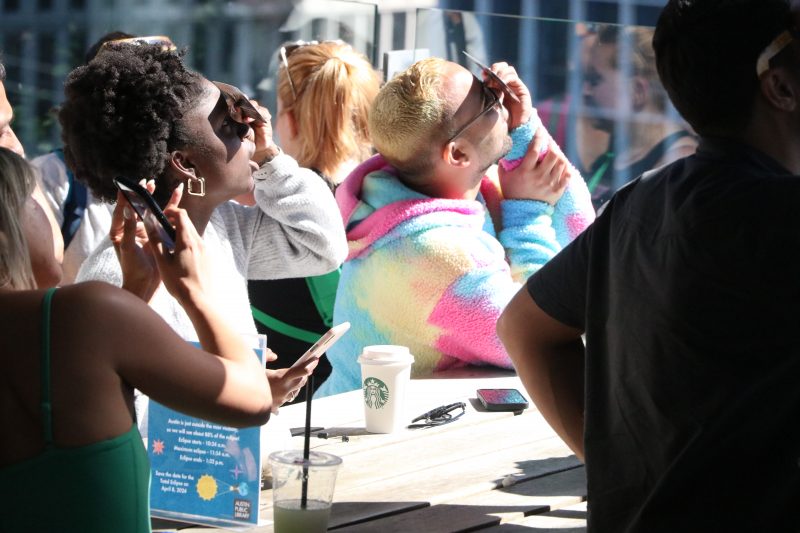
Tanisha Mark, left, views the solar eclipse with friends from the rooftop at the Central Library during a viewing party that drew dozens. Katrina L. Spencer/Reporting Texas
After a summer spent trying to get away from the sun, Central Texans couldn’t take their eyes off of it Saturday — safely, of course.
Through protective glasses, they watched a solar eclipse in which the moon covered 93 percent of the sun just before noon. A swath of Texas through the Hill Country to San Antonio experienced even more coverage during the annular eclipse, in which the moon moved in front of the sun but was too far from Earth to block the sun completely.
In some ways, Saturday was a dress rehearsal for April 8, 2024, when the Austin area will be in the path of a total eclipse — the first total eclipse here since the 14th century.
Here’s how some Austinites celebrated and experienced Saturday’s heavenly event.
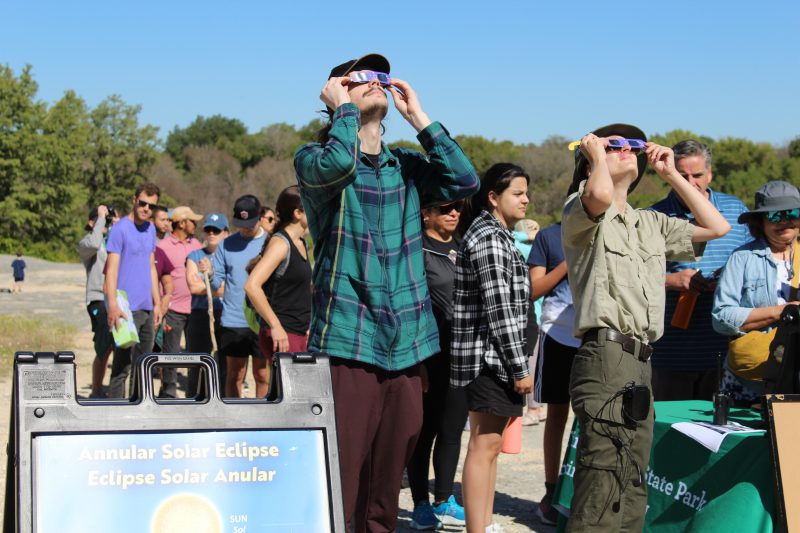
Red Ezra, left, and McKinney Falls ranger Lauren Sweat view the annular solar eclipse with solar glasses. Anissa Sanchez/Reporting Texas
At State Park, a New Perspective on Nature
The last annular solar eclipse that passed through Texas’ line of vision took place in 2017. Six years later, several dozen Austinites and tourists gathered at McKinney Falls State Park to experience Saturday’s eclipse..
“This week I was doing a lot of practice with the telescope; it’s been a while since I pulled it out,” park Interpreter and volunteer coordinator Lauren Sweat said.
Seventeen state parks were in the path of Saturday’s eclipse, and the parks department was expecting a busy day. At McKinney Falls, on Austin’s southeastern edge, visitors set up chairs and laid out blankets to gaze overhead at the gradual progression of the moon covering the sun. “I think I got some good shots,” said Kaden Hayes, who used his newly purchased iPhone 15 to take pictures. During the eclipse’s prime moments, Hayes quickly adjusted and readjusted his camera settings for the best lighting. “This definitely reminds me of the song ‘Black Hole Sun’ by Soundgarden.”
As the eclipse reached its peak, the temperature dropped, and the daylight dimmed, looking more like a dimly lit evening than high noon.
Sweat told visitors that some insects and animals have a tendency to get confused during eclipses. Crickets and cicadas have also been known to pick up, while insects such as bees will return to their hive or homes.
“For pretty much every living thing out here, it causes some confusion because it’s disrupting the natural rhythm that they have,” she said. “Experiencing darkness around them makes them question, ‘Is it supposed to be nighttime right now?’”
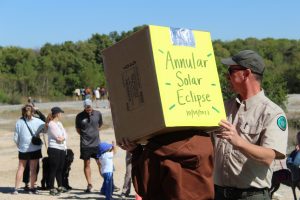
Texas Parks and Wildlife superintendent Tommy Cude explains how to properly use an eclipse viewing box to view a reflected shadow of the annular solar eclipse. Anissa Sanchez/Reporting Texas
Although Austin will see a total solar eclipse next year, Saturday’s annular solar eclipse took a unique shape overhead. Annular eclipses can only occur when the moon is too far away from the earth in its orbit to fully cover the sun.
“The moon’s path, its rotation around the earth, is not a perfect circle,” Sweat said. “Right now, it’s a little bit further, which is why we are going to catch that ring of fire effect today. Whereas in April, it will be fully covered. The moon will be a little bit closer to us the next rotation.”
Sweat explained that the sun is 400 times larger than the moon and 400 times farther away. This is what makes solar eclipses possible due to their identical sizes when viewed from Earth.
“Things like this always put life into perspective for me,” park visitor Eric Harrison said. “It makes me realize that we are just a floating rock in space and we are lucky to even be standing here right now.”
— Anissa Sanchez
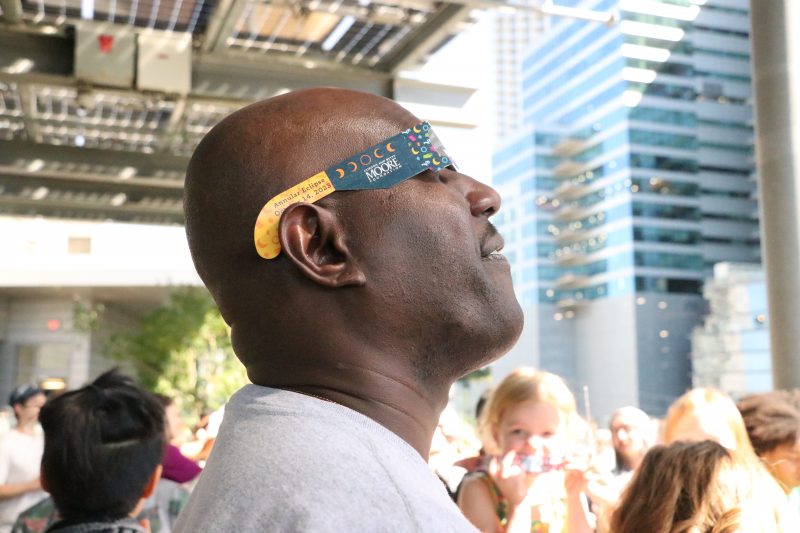
Marine veteran Karim Brown views the solar eclipse at the Central Library’s rooftop viewing party. Katrina L. Spencer/Reporting Texas
A Solar Eclipse Gathers All Kinds Under the Sun at the Library
“I didn’t expect it to look like that,” said Bryan Johnson. Along with scores of visitors, he and his partner Kristen McDonald drove in from Houston to attend the solar eclipse rooftop viewing party at Austin’s Central Library downtown.
It was one of five eclipse events at Austin public libraries Saturday. Some lined up at the Central Library before it even opened.
“We didn’t anticipate this many people would be excited about it,” said community engagement librarian Laura Tadena. “We knew how much of a rare experience this was going to be so we started planning in spring.”
Library staff distributed protective eyewear to visitors early in the week and Saturday. When supplies ran out, attendees with glasses shared with those who did not have any.
“I have been looking for glasses all week,” said Josh Zamarripa who brought his partner Gabriela Torres and three daughters. When not viewing the eclipse with protective eyewear, 10-year-old Naomi, 7-year-old Naiya and 4-year-old Nalani spent their time coloring space-themed handouts.
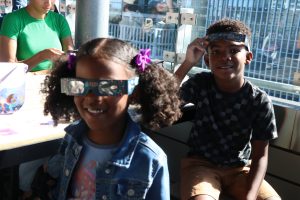
Lola and Levi Eugene show off their eclipse glasses on the rooftop terrace at the Central Library. Katrina L. Spencer/Reporting Texas
“We woke up early,” said Levi Eugene, 8, when asked what he did to prepare for the event. “And I skipped breakfast,” he added.
Others came upon the gathering by chance. “I didn’t even know it was happening,” said Sidi Tangara, 36, an accountant from Mali who is visiting Austin from Switzerland and saw his first solar eclipse Saturday.
Nora Oukil from Algeria captured and texted pictures of the eclipse to her husband who had to work Saturday.
“It’s very rare and that’s why people want to be a part of it,” said Malgorzata “Gosia” Sawoniewicz of Poland.
The library system plans more eclipse viewing parties for the April 8, 2024, event.
“We only have one life to live,” said Ade Adedapo of Nigerian descent. “You gotta live it to the fullest.”
— Katrina L. Spencer
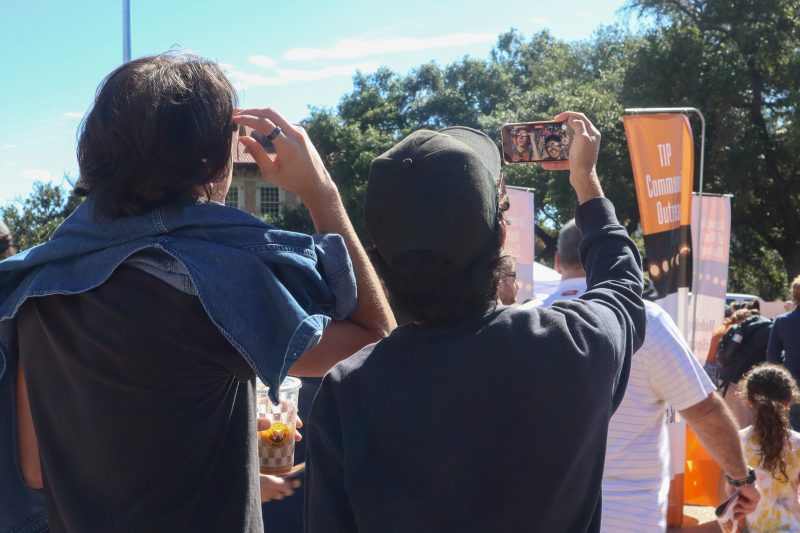
University of Texas students and others view the partial eclipse on the university South Mall during a watch party. Michelle Lavergne/reporting Texas
Hundreds Enjoy the Eclipse and Scientific Thrills at UT
Sounds of children’s laughter filled the air as they jumped up and down inside bouncy castles set up on the University of Texas’ South Mall. Their parents were equally thrilled as they split their attention between watching their little ones and looking up at the clear blue sky to sneak some peeks at the sun’s glowing crescent shape through eclipse glasses.
This watch party, hosted by the UT-Austin College of Natural Sciences, had a place of fun and wonder set up for eclipse enthusiasts of every age. College groups offered science-themed activities to kids, including building a hovercraft and making models of the eclipse and lunar phases. The UT Society of Physics Students served liquid nitrogen ice cream.
But the telescopes pointed skyward commanded the most attention on a day dedicated to viewing a partial eclipse.
“Being in the path of totality or annularity — that is rarer,” said Lara Eakins, senior program coordinator in the department of astronomy. “To truly have that ring of fire effect, you had to be on a path that was south and west of Austin.”
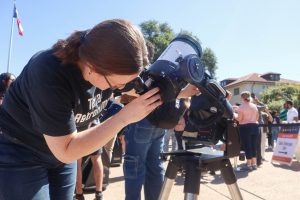
Lara Eakins, senior program coordinator for the University of Texas College of Natural Sciences, prepares a telescope for stargazers on UT’s South Mall. Michelle Lavergne/Reporting Texas
Austinites will be treated to a total eclipse in six months. The last total eclipse here was over 600 years ago, in 1397, Eakins said.
Now that this year’s solar eclipse has passed, people are starting to make plans for viewing the next one. Eakins offered a fun fact for people who do not know that for total eclipses: Protective eyewear will not be needed 100 percent of the time.
“In those minutes when it’s completely, totally eclipsed, that is the one time it is completely safe to take your glasses off — but only at totality,” Eakins said. “However, you need to know the exact time. You don’t want to do it too soon or for too long, so knowing those times is very important.”
Since the total solar eclipse happening in April 2024 is on a Monday when classes are in session, the university will plan the next watch party so that everyone across campus can partake in the celestial event together.
— Michelle Lavergne